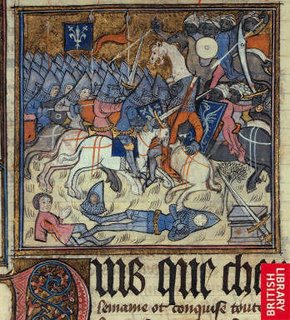
Crusaders vs. Saracens
What are Pope Benedict’s real opinions regarding Islam? Was Islam even an intended target of his remarks? Christopher Blosser is the webmaster for the Ratzingerfanclub. On his blog, Against the Grain, he has put up a very helpful post called So what DOES Pope Benedict XVI think about Islam?, in which he presents the remarks made when the Holy Father spoke at length about his opinions concerning Islam in Cologne on World Youth Day. They are worth taking a close look at.
Here is an audio interview I heard this morning concerning the whole flap with John Allen and author James Reston. I think John Allen does a pretty good job here of putting the whole thing in context. If there was an intended target in his speech, does it appear to have been Islam, or Western secularists steeped in scientism?
In trying to make a point about faith and reason, Benedict, who is uncomfortable criticizing the Church’s past or admitting Church errors, may have unwisely chosen Islam for an anecdote about faith and reason, without intending to target Islam at all. At first, I had a hard time believing that he may have chosen words carelessly, but I am wondering now if this was just an unintentional gaffe on his part. The Holy Father has spent most of his life in academia, and actually has very little pastoral experience. Did that lack of experience come into play here? Speaking in an academic setting, and having found a quote which seemed to fit the bill for what he was trying to say, did he simply fail to take into account what the effect of his words might be? Is that the real story behind the story?
6 comments:
I think it is true that an academic expects his comments to always be considered in their context and is not ready for the out of context sound bite. Still, a leader of Benedict's stature must be more careful. I think he should be more willing to use examples of Catholicism's failings as well, but I won't hold my breath for it.
John Allen also wrote an opinion piece ( http://www.nytimes.com/2006/09/19/opinion/19allen.html ) in the Times today that's worth looking at.
I think an important thing, if one wants to criticize elements in Islamic society, one should do so 1) unbelievably diplomatically, since the situation is so bad right now and Muslims are understandinly sensitive about criticism coming from the West, and 2) making it very very clear that you are criticizing those elements and not Islam itself. Does it make sense to criticize Saudi Arabia's lack of reciprocity (see Allen's article)? Of course -- but criticize Saudi Arabia, not Islam. Everyone should condemn terrorism, but condemn Al Queda, not the concept of Jihad which many Muslims feel is misinterpreted by Al Queda.
I'm afraid that all too many both in the Church and in Western society at large are gearing up for a clash of civilizations. Reading through different blogs has been very upsetting -- I've even lost sleep over it.
Pray for peace.
Great links, Jeff.
Amen, Liam. Well said.
That's about all I'm going to say about this topic unless someone else has something they'd like to add.
Thanks Crys,
I especially appreciated how the Pope brought up Nostra Aetate when he stated (emphases mine):
"In this regard, it is always right to recall what the Fathers of the Second Vatican Council said about relations with Muslims...
For us, these words of the Second Vatican Council remain the Magna Carta of the dialogue with you, dear Muslim friends, and I am glad that you have spoken to us in the same spirit and have confirmed these intentions.
Speaking in an academic setting is a lot different than a pastoral setting, and perhaps the pope lost sight of the fact that every word of his is scrutinized, regardless of where or how he meant to say it.
Hi Steve,
Right. As Pope, his words are scrutinized a lot more closely than they were by just Vatican-watchers when he was head of the CDF.
I know a lot of people probably think I'm naive about this whole issue, but I'm sanguine about the way things are in the world... We, however, are called to make a difference. If Christians can't remain hopeful when things look darkest, when Christians can't find a way to keep looking for peace when there seems to be no possibility for it, then we can be certain that no one else will. No one.
Post a Comment